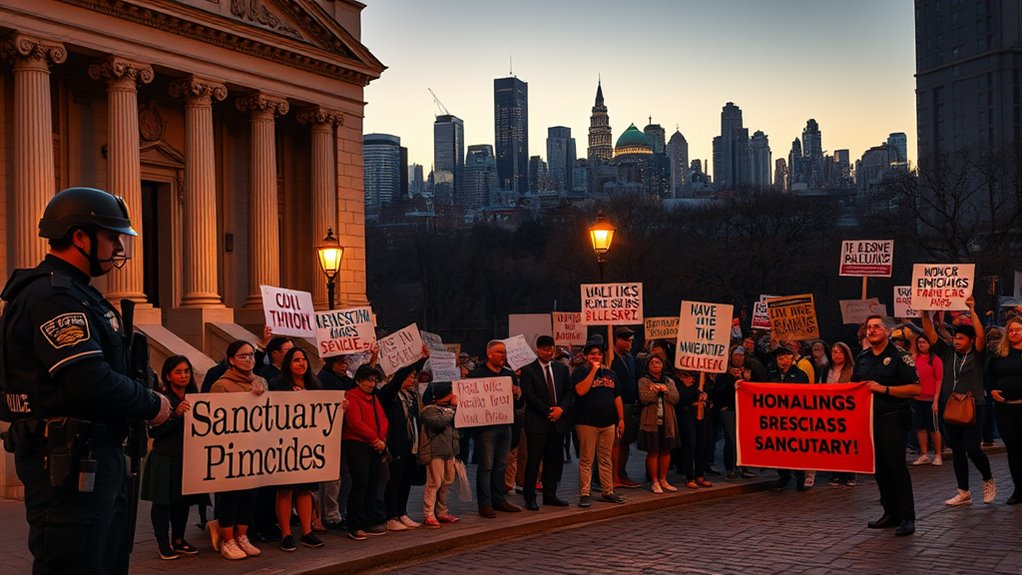Immigration law battles often pit sanctuary city policies that focus on community trust and protecting vulnerable populations against federal efforts to strengthen border security and enforce immigration laws. Supporters of sanctuary policies argue that cooperation should respect human rights, while opponents believe stricter enforcement is necessary to combat illegal crossings and crime. This ongoing conflict reflects deeper debates over national security, values, and community bonds. If you keep exploring, you’ll discover how these issues continue to shape the future of immigration law.
Key Takeaways
- Sanctuary policies prioritize community trust and protect vulnerable immigrants, while federal enforcement focuses on strict border security and immigration law compliance.
- Debates center on balancing local autonomy and federal authority, reflecting broader conflicts over national security, economic growth, and humanitarian concerns.
- Supporters of tighter border controls advocate for physical barriers, surveillance, and increased personnel, contrasting with sanctuary advocates emphasizing community safety through trust.
- Legal reforms vary from expanding legal pathways and streamlining processes to increasing detention and deportation policies, fueling ongoing conflicts.
- Technological advancements in border security shape enforcement effectiveness, intensifying ideological clashes over immigration control versus compassionate integration.

Immigration law battles have become a battleground for political ideologies, reflecting the ongoing debates over national security, economic growth, and humanitarian concerns. At the heart of these conflicts are tensions between sanctuary policies and federal enforcement efforts. You might see sanctuary policies as a way for local governments to prioritize community trust and protect vulnerable populations, but critics argue they undermine border security and complicate federal efforts to uphold immigration laws. Conversely, federal authorities push for stricter enforcement and legal reforms aimed at tightening border security, reducing illegal entry, and ensuring that immigration laws are uniformly applied across states. This clash creates a complex landscape where local autonomy often conflicts with national priorities.
Border security is an essential concern in these debates. Advocates for tighter border controls emphasize the need for physical barriers, surveillance technology, and increased personnel to prevent illegal crossings. They believe that robust border security measures are vital for safeguarding national interests, controlling crime, and managing the flow of undocumented immigrants. On the other hand, supporters of sanctuary policies argue that community safety depends on building trust between law enforcement and immigrant communities. They contend that cooperation with federal agencies should not come at the expense of human rights or community cohesion. This divide influences how legal reforms are shaped, with some pushing for thorough changes that include stricter border measures, while others seek to protect the rights of immigrants and limit cooperation with federal enforcement. Additionally, the technology used in border security continues to evolve, impacting how effectively borders can be monitored and controlled.
Legal reforms play a pivotal role in these ongoing battles. You might see efforts to overhaul immigration laws to make them more efficient and humane or to impose harsher penalties on those who violate them. Some reforms focus on expanding legal pathways for immigrants, streamlining visa processes, and offering pathways to citizenship for undocumented immigrants who meet certain criteria. Others aim to crack down on illegal immigration through increased detention, deportation policies, and the expansion of immigration enforcement agencies. These reforms are often hotly contested, with proponents saying they are necessary for national security and economic stability, while opponents argue they threaten immigrant communities and violate human rights.
Ultimately, the fight over border security and legal reforms reflects broader ideological conflicts about America’s identity and values. You’re caught in the middle of a debate that shapes policies affecting millions of lives—decisions that determine whether the country prioritizes compassion or control, community bonds or strict enforcement. As these battles continue, understanding the underlying issues and the stakes involved can help you navigate the complex landscape of immigration law, recognizing that each side believes it’s working toward the country’s best interests.
Frequently Asked Questions
How Do Sanctuary Policies Impact Local Crime Rates?
Sanctuary policies can influence community safety by encouraging undocumented immigrants to cooperate with law enforcement without fear of deportation. This cooperation can lead to better crime reporting and more effective law enforcement efforts. While some worry about increased crime, evidence suggests these policies often help improve community safety by fostering trust and collaboration, making it easier for law enforcement to address local issues and keep neighborhoods secure.
What Legal Protections Do Undocumented Immigrants Have?
You might think undocumented immigrants have no protections, but that’s not true. They have fundamental legal rights and due process under the law, including protections against discrimination and unlawful detention. While their status complicates things, they’re still entitled to fair treatment, legal representation, and access to courts. Stay aware—these rights are vital, and understanding them helps guarantee everyone’s protections are upheld, regardless of immigration status.
How Do Federal and State Courts Differ in Immigration Cases?
You’ll find that federal courts have broader judicial authority and legal jurisdiction over immigration cases, often handling issues involving federal immigration laws and policies. State courts, however, focus on cases within their jurisdiction, like local immigration disputes or enforcement actions. This distinction means federal courts typically deal with more complex, nationwide issues, while state courts handle more localized matters. Your case’s jurisdiction determines which court will hear and decide it.
Can Local Jurisdictions Be Sued for Implementing Sanctuary Policies?
Yes, local jurisdictions can be sued for implementing sanctuary policies if liability concerns arise or if authorities challenge the policy’s legality. You might face lawsuits claiming that sanctuary policies violate federal immigration laws or undermine enforcement efforts. Courts will review whether your policies comply with legal standards, and if found unlawful, you could be held liable. It’s vital to guarantee your sanctuary policies are legally sound to avoid legal challenges and liability concerns.
What Are the Economic Effects of Sanctuary Cities?
You might see sanctuary cities boost economic growth by attracting diverse talent and fostering innovation. Conversely, some argue they increase public expenditures due to higher healthcare, education, and law enforcement costs. While proponents emphasize the long-term economic benefits of inclusion, critics worry about strain on resources. Ultimately, sanctuary policies create a complex economic landscape, balancing growth opportunities against immediate fiscal challenges.
Conclusion
So, you see, these sanctuary struggles shape society’s stance on security and sovereignty. By balancing border battles and benevolent policies, you can better understand the broader breach between federal enforcement and local liberties. Recognize the real risk, respect the reforms, and remember that resolving these raging rifts requires reason, resilience, and responsible dialogue. Only then can you hope for harmony, harmony that helps heal the harsh history and hopeful future of immigration law.










